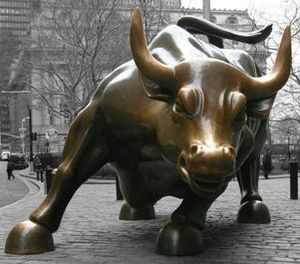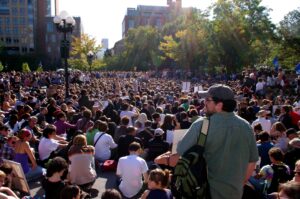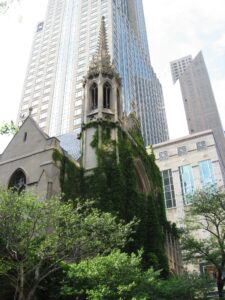A RESPONSE TO THE OCCUPY MOVEMENT
November 1, 2011, by Editor Chris Iosso, who invites Christians into dialogue about the role the church should play in the Occupy Movement. A golden calf—that looks like the Wall Street bull statue—is carried through New York’s Zuccotti Park encampment by a bunch of ministers. Truth telling and fun, for a group now in Valley Forge mode. A Rev. Brian Merritt makes the equal sign on the foreheads of folks in an outdoor ceremony at Occupy D.C. (or K Street). Rev Billy, whom the New York Review of Books calls a “Billy Graham Impersonator,” does some outdoor preaching—more John Wesley’s style really.
A golden calf—that looks like the Wall Street bull statue—is carried through New York’s Zuccotti Park encampment by a bunch of ministers. Truth telling and fun, for a group now in Valley Forge mode. A Rev. Brian Merritt makes the equal sign on the foreheads of folks in an outdoor ceremony at Occupy D.C. (or K Street). Rev Billy, whom the New York Review of Books calls a “Billy Graham Impersonator,” does some outdoor preaching—more John Wesley’s style really.
The semi-Quaker, semi-Anarchist gatherings adhere to an ultra-democratic process that is almost ritual, despite the everyday-transcendent quality of the occupations, what a ReligionDispatches.org author calls the “rupture of the ordinary” (http://www.religiondispatches.org/archive/politics/5268/god_dissolves_into_the_occupy_movement/). Some of us think about reversing Jesus’ story of the one lost sheep to look at the 99 “lost” in our current economy, as does InterfaithWorkerJustice.org.
But what do you think about this mixture of protest and teach-in and awakening? This piece is meant to prompt a dialogue. Fundamental point to debate: Are these events in tune with the Spirit of God? Would Jesus be allowed to speak—when Occupy Atlanta did not allow Congressman John Lewis to speak—despite his great civil rights record? And do the police, who have notoriously attacked the Occupy Oakland effort—one of the most ethnically diverse—have reason to worry about these non-violent souls? Should our church leaders speak out—as have the UCC and others?
Further, in this editor’s view and as weather gets colder, Jesus’ hospitality suggests that wherever possible we open our churches to these fellow and sister citizens as they gather and include a percentage camping outside. Certainly, with few exceptions, the Occupy protests have shown thoughtful democratic organization and respect for public order, despite their anger at what they perceive to be failures in our economic order. At the same time, in London, the Dean of St. Paul’s Cathedral has resigned over a kind of impasse with protesters around that building. So it may be quite a debate in any church, even if the protesters were willing to come inside.
Of course, the Presbyterian General Assembly has not spoken specifically to the recent spread of outdoor protests focused on economic inequality and the role of our financial sector in the undeniably uneven distribution of wealth in our country. Yet we have shared those concerns—see below. And the Presbyterian Church (U.S.A.) has been steadfast in supporting the right of Americans to assemble to protest, to petition for redress of grievances, so we should honor that right today, whatever the mix of conviction and ferment motivating what the protesters call their “general assemblies.”
Some see the origin of current protests in the response of Wisconsin citizens last winter to efforts in that state to eliminate public employee collective bargaining and unilaterally reduce retirement benefits. Others point to September 17, 2011, the beginning of Occupy Wall Street, suggested by “adbusters” and supported by the internet group, “anonymous.” From a faith perspective, we look to perennial human needs for justice and dignity, needs that are best served by institutions with democratic accountability. One aspect of the occupy protests is their notable distrust of institutions and markets seen to be “rigged” in favor of the powerful. As leader of a religious and social reform movement in Palestine, Jesus himself denounced violence, greed, and oppression while resisting moves to treat God’s reign as a conventional kingdom or political faction. God’s justice and peace put all the claims of caesars under judgment. Even the church, in our Protestant tradition, is to be reformed and always being reformed, ideally an example to all organizations.
 Much has been said about the protesters’ lack of specific demands and their refusal to align themselves with either major political party. Those are strategic judgments about power and purity of message; their concerns are clearly about the social application of morality, concerns that the Presbyterian Church and its ecumenical partners have long shared. In recent years, the General Assembly has addressed that inequality in the Social Creed (2008) and in a report on the theology of compensation, “Neither Poverty Nor Riches,” just last year. Last year’s Assembly also authorized a study team to work on the economic crisis, including its impact on inequality and poverty affecting the church itself. Thus this statement is meant to emphasize mutual understanding between Presbyterians and the protestors, some of whom are our own children, relatives, and neighbors.
Much has been said about the protesters’ lack of specific demands and their refusal to align themselves with either major political party. Those are strategic judgments about power and purity of message; their concerns are clearly about the social application of morality, concerns that the Presbyterian Church and its ecumenical partners have long shared. In recent years, the General Assembly has addressed that inequality in the Social Creed (2008) and in a report on the theology of compensation, “Neither Poverty Nor Riches,” just last year. Last year’s Assembly also authorized a study team to work on the economic crisis, including its impact on inequality and poverty affecting the church itself. Thus this statement is meant to emphasize mutual understanding between Presbyterians and the protestors, some of whom are our own children, relatives, and neighbors.
In a way, the protests have been the equivalent of the young boy in the story who pointed out that the king had no clothes on, after he had been beguiled by charlatans pretending great fashion sophistication. That parable about conformity was also about the role of prophetic voice, challenging widely accepted but really unacceptable patterns of accommodation to power. In this case, the critique is addressed to Wall Street financiers and their enormous wealth, but also to a political process that is in fact corrupted by unlimited funds from those, yes, in the top 1%.
Many Presbyterians are in the top 1%, and many of us have worked very hard for that economic success. This editorial does not deny the need for productive and creative industry and achievement. It does, however, support the need for equitable distribution of productivity gains in our society, and a society where benefits and burdens are more fairly shared. We would urge the Occupy movement to look at the Social Creed for the 21st Century affirmed by most mainline Protestant and Orthodox churches. Among its affirmations, the churches call for:
- “Tax and budget policies that reduce disparities between rich and poor, strengthen democracy, and provide greater opportunity for everyone within the common good.”
 With more than 25 million US citizens unemployed, underemployed and discouraged from even seeking work, the mainline churches have consistently called for the government to take the initiative in measures to restore full employment. We believe that every person, created in the image of God, has a vocation to serve that common good. In prior versions of the Social Creed, such as that during the Great Depression in 1932, the General Assembly has also called for fair regulation and taxation to eliminate poverty and to protect citizens from boom and bust business cycles and exploitation by those with inordinate power, whether economic or political. The recent Social Creed calls for:
With more than 25 million US citizens unemployed, underemployed and discouraged from even seeking work, the mainline churches have consistently called for the government to take the initiative in measures to restore full employment. We believe that every person, created in the image of God, has a vocation to serve that common good. In prior versions of the Social Creed, such as that during the Great Depression in 1932, the General Assembly has also called for fair regulation and taxation to eliminate poverty and to protect citizens from boom and bust business cycles and exploitation by those with inordinate power, whether economic or political. The recent Social Creed calls for:
- “Employment for all, at a family-sustaining living wage, with equal pay for comparable work.
- The rights of workers to organize, and to share in workplace decisions and productivity growth.”
These are hardly new ideas, but they must take new forms under new pressures and with honest awareness of environmental and other threats, including the morally corrosive nature of inequality and the undemocratic consequences of unlimited money in politics.
But Occupy is also about expanding the political imagination, or perhaps re-grounding it. One-time Presbyterian seminarian Chris Hedges points out the radical inclusiveness that integrates street people and an engagement of those with squatter and off-the-grid experience: read his article.
Let us then respond to these widespread protests with historical understanding and join with all persons in our society—not only the Occupy protesters—who are encouraging major, constructive reform of both our economic and political institutions. And if our church buildings can provide hospitality for dialogue and debate, may that, too, be a constructive opportunity for mutual understanding.
The Rev. Christian Iosso, Ph.D., is the Senior Editor of Unbound and Coordinator of the Advisory Committee on Social Witness Policy. Banner photo comes from Wikimedia Commons by S51438.












Read this response from TC Davis, “Why this pastor supports the Occupy Wall Street Movement” – http://interfaithreflections.com/wp/2011/11/07/why-this-pastor-supports-the-occupy-wallstreet-movement/.
Read another take from Chris Hedges, “Finding freedom in handcuffs” – http://readersupportednews.org/opinion2/275-42/8285-finding-freedom-in-handcuffs.
Thanks, Chris and Patrick, for the work you’re doing with this new journal.
Responding to the criticism of OWS, that it has no identifiable leaders: It seems to me that the people who are drawn to the movement are so fed up with government officials’ servility to oligarchs that they have become cynical about politics in general. If the movement is to have a positive impact its members must get over this cynicism. The encampments have been important because they have given participants time to get to know each other, and to begin to establish trust, an antidote to cynicism. I believe that at some point the movement will impact politics. I’ve heard that there will be an OWS Constitutional Convention on July 4th, 2012. It appears likely that that convention will result in both the recognition of movement leaders, and prominent issues for the November election.
First, let me thank all those involved in the creation of Unbound. May it serve as a forum for all those seeking justice. I read your article soon after Unbound went online and I was reminded of it tonight as I watched the lead piece on Countdown. Keith told how many of the recently evicted OWS protesters were sleeping in churches in New York. He said that two ministers had recounted similar strange events last night. Two men came to the doors of the church in both cases and asked to be allowed to use the restroom. After being told how to find the restrooms the men instead went into the sanctuary of the church and began counting the number of people sleeping in there. When asked to explain themselves, they identified themselves as NY policemen and asked: “Do you think it is a good idea to allow these people to be here? We wouldn’t want anything to happen to your church!” I know that sounds like a line from a bad gangster film but it is really scary in light of the manner in which the NYPD removed the sleeping protesters from the park in the middle of the night. Apparently they are being coached by Homeland Security and are using military weapons like sound canons on peaceful American citizens. They cut up the tents and damaged much of the protesters private property. We have all seen the videos of the out of control officers beating unarmed civilians. Will they be removing them from the churches in a similar manner? Chase has given the NYPD a contribution in the millions and the city is spending it and more millions of city tax dollars to harass these peaceful Americans practicing their first amendment right to assemble and petition the government for a redress of grievances. Mayor Bloomberg cited safety concerns as the reason for the protesters removal but the unsafe conditions he created in removing them belies that excuse. The police are acting as private security for the 1% instead of protecting the 99% as they are sworn to do. It has always been like that. The powerful use the civil authorities to attack the very people they are supposed to protect. I know that the 1% are not very good at history or foreign affairs because, if they were, they would know that this tactic has turned out badly for those who have employed it in the past and those who are employing it in the middle east. Keith finished the show with a repeat of last night’s interview of an 84 year old grandmother who was pepper-sprayed at the Occupy Portland event. She said that she grew up in Germany as the National Socialists were taking power and has always feared the loss of individual rights. She said that she had participated in the Civil Rights, Anti-War, and Anti-Nuclear movements and would continue standing up for Human Rights when ever she saw them endangered. She told how a nun she met at a protest at our missile silos told her that you must always take one step outside your comfort zone when confronting evil. She said that she was particularly worried about the bills in congress controlling the internet and social media because she remembered how the newspapers dwindled to just one when she was growing up and there was no way to argue against what it said. I believe that the OWS movement has already switched the conversation from cutting social support programs and creating a flat regressive income tax so that the 1% can keep more of what they steal from our economy to the obvious inequality of the distribution of wealth in America. In that, the movement is already a success. The 1% are attacking them because the movement is growing as more and more Americans recognize their own complaints on the voice of the movement and see more and more people just like themselves on the front lines. While the movement has not coalesced their demands yet, I believe that removing private money from all elections of public officials and outlawing lobbyists would be two good ways of breaking the 1%’s grim on civil authorities.